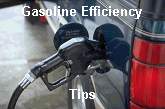Skip Navigation
ECS HomeNews
Energy
Assistance
Programs
Lowering
Energy Bills
Energy
Programs
Refugee
Programs
NH Energy
Facts
Energy Efficiency
Programs
Fuel Prices
Electric
Industry
Restructuring
Links &
Resources
Contact ECS
Site Map |
 Gasoline Efficiency Tips Gasoline Efficiency Tips
Maintainenance &
Fuel // Driving // Trips, Errands, Commuting,
Vacations // Purchasing Vehicles // Links
You can save money while reducing both fuel consumption and air pollution by following
some of the tips listed here. Which steps you choose to take will depend on your own
particular circumstances, but any of them will reduce the amount of money you spend for
gasoline.
Maintenance & Fuel
- Replace air and fuel filters regularly as instructed by your vehicle's maintenance
manual; change air filter more often if driving in dusty conditions.
- Keep engine properly tuned.
- Use API certified "Energy Conserving" motor oil. Use the
service classification and viscosity specified for your vehicle. Example: SJ and 5W-30.
- Do not buy "aggressive" tread tires if you do not need them.
- Keep tires properly inflated and wheels aligned.
- Do not use mid-grade or premium grade gasoline unless specified for your vehicle. Older
vehicles may require these grades to avoid "knock" which reduces power and may
damage the engine.
- Do not overfill the tank.
- Determine gasoline mileage periodically. Declining mileage can be an early indicator of
mechanical problems.
- Store emergency fuel supply or fuel for gasoline-fueled power equipment in sealed,
air-tight containers and it will still be usable in another season.
[back to top]
Driving
- Avoid rapid acceleration; most horsepower (consumes a lot of gas) is
built into cars for acceleration; relatively little power (and thus fuel) is consumed to
maintain speed.
- Avoid hard braking and sudden stops. Stay alert and anticipate traffic
lights, stop signs and merges. Use turn signals. Traffic will move more smoothly, which
saves fuel for everyone.
- When starting out, shift up to the next gear (manual transmission) as
soon as possible without straining the engine.
- Drive more slowly. One study reported that for all vehicles tested there
was at least 20% loss in fuel economy from 55 to 75 mph. So, 20 mpg at 55 mph becomes 16
mpg or less at 75 mph.
- If your car has an instantaneous mpg indicator, use it to improve your
driving efficiency.
- Remove extra weight from the car; 100 extra pounds may cost 1 mpg. Pack
lightly for trips.
- Try to avoid using roof racks and remove when they are not in use.
- Use cruise control on highway trips.
- For any stop you expect to last more than a minute, shut of your engine
rather than letting it idle.
- Do not warm engine up before driving; it is not necessary, even in cold
weather.
- Do not rev engine before shutting it off; this wastes fuel and can dilute
motor oil.
- Reduce the use of your air conditioner at low driving speeds. When
driving over 40 mph using the air conditioner costs less fuel than having windows open.
- Park in the shade and/or leave windows slightly open to reduce the need
for air conditioning.
[back to top]
Trips, Errands, Commuting, Vacations
- Carpool if possible for traveling to work or for errands.
See the NH Department of
Transportation RideShare Program for more information.
- Combine errands to reduce the number of trips.
- Utilize mass transit. Support efforts to make mass transit
more available.
- For shorter errands, consider walking or bicycling.
- Try to take one less car trip per week.
- Try to work or study at home at least part of the time.
- Consider living closer to where you work, or working closer
to home.
- Consider shorter vacation and recreation trips; learn
what's special in nearby nature, culture and history.
[back to top]
Purchasing a Vehicle
In purchasing, consider buying:
- the most fuel-efficient vehicle that will meet most of your needs, and rent a larger
vehicle or a different kind for infrequent needs;
- fewer power options such as automatic transmission and especially air conditioner;
- 2-wheel drive if you really don’t need 4-wheel drive.
[back to top]
Links
[back to top]
Reduce Home Energy Costs / Energy Efficient Home Heating / Summer
Conservation Tips /
Energy Efficiency Programs in NH / Gasoline
Conservation Tips / Free Publications
ECS Home | News | Energy Assistance Programs | Lowering Energy Bills | Energy Programs | Refugee
Assistance | NH Energy Facts
Energy Efficiency Programs | Fuel
Price Information | Electric Industry
Restructuring | Links & Resources | Contact ECS | Site Map |
